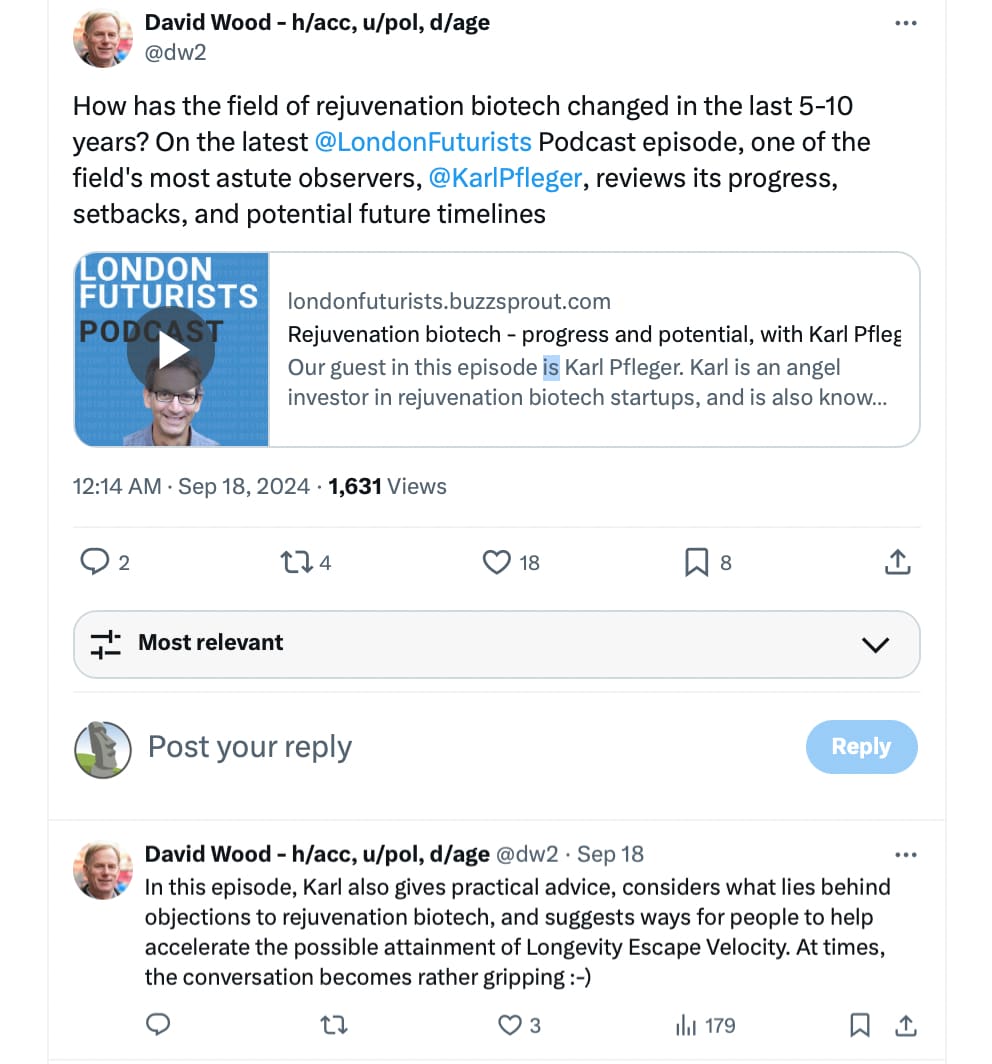Karl Pfleger is one of the more prolific angel investors in the longevity industry. In addition to his investment and conference-going activities, Pfleger runs the very useful Aging Biotech Info resource, which has expanded from the starting point of a list of companies in the longevity industry to its present state of listing of a great many more items: conferences, books, blogs, interventions, diagnostics, and so forth. In the podcast interview linked below, topics include epigenetic clocks and the need for improvement in measurement of biological age, current interventions, and the state of the field as a whole.
Excerpt from podcast interview with Karl:
I worked at Google for about a decade doing practical, big data, machine learning stuff and then I decided to refocus my attention on things that would most help the world, most help the most people in the world. And cursory analysis suggested that besides the poorest of the poor, you know, living in sub-Saharan Africa and places like that on less than 2 a day, the the highest leverage other thing in the world was to fight against the aging process, because aging is what kills the vast majority of people, 70% globally, 92 and a half percent plus in Western developed countries. That’s really a science and technology play more than a lobbying political play. So I decided and also I lived in the San Francisco Bay Area, which was kind of ground zero for that science and the biotech and the entrepreneurship and so I just basically whole hog switched fields and have just been ramping up the bio knowledge ever since. I started with philanthropy then got into investing and I’m also doing a whole bunch of other things involved in community building and information dissemination.
I started in the field in the mid 2010s, there was it was much smaller field. It’s grown considerably, which is great. It’s still a very small corner of the overall biotech world. But but it’s growing because there’s an inevitable logic of treating these biological causes that underlie so many different bad conditions. But when I got into the field, it was small, but there was still quite a lot written about it. There were books and there were blogs, and it was a lot of blobs of text, and there were some companies already in the space, and I decided to get into investing in the 2016-ish and started investing in biotech companies in 2017. One of the things I did once I started doing that was every time I went to a conference or an event where any company was mentioned, I wrote it down on the list and quickly my list of companies was 100 to 120 companies.
You know, I hadn’t investigated each one, so I wasn’t sure whether I counted each one as, you know, really being an aging and longevity related company or not. But so it was all new. So I didn’t have an exact count 100, 120. And I kept reading these stories of people talking who were giving an overview of the whole aging or longevity field, talking about how there’s 30 companies where there’s 40 companies or usually there’s 25 companies, something like that. And I was like, wow, these people don’t know about a lot of the companies. And I would talk to the professors who work in the field. So just north of me here in San Francisco, there’s a place called the Buck Institute for Research on Aging. It’s the largest independent. It’s essentially a sort of Ivy League Stanford or MIT level biology department, sitting all by itself without the rest of the university around it. Every single one of the 20 pitches are all focused specifically on the biology of aging. And that was the most ground zero at academia for aging stuff. And they didn’t even realize how many companies there were at the moment.
Introduction to Podcast:
This week, we speak with Karl Pfleger, PhD, who, after studying machine learning at Stanford and working a successful tech career, now does all he can to support longevity research and biotech. Karl discusses the inadequacies of traditional healthcare in addressing the root causes of aging and shares insights on groundbreaking research that can slow down or even reverse aging processes. He emphasizes the significant impact of lifestyle choices on longevity and previews promising future therapies, including stem cell treatments and mitochondrial health interventions.
Karl’s website:


